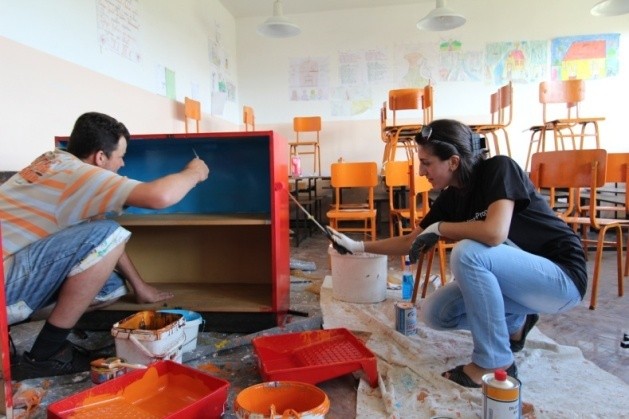
The war that ravaged Kosovo in the late 1990s took a devastating toll on the country’s infrastructure, and its schools were no exception. Even in 2010, when USAID launched its Basic Education Program, most classrooms were little more than open rooms with very few of the kinds of educational materials that could be found elsewhere in Europe.
Since the war’s end, the rebuilding and modernization of the public education system had been largely dependent on foreign aid, and to some extent on the Government of Kosovo, so USAID decided to help communities play a bigger role in improving educational opportunities for their children.
USAID introduced a “classroom makeover” initiative to be accomplished through direct community engagement, which was quickly picked up in 2011 for a TV series broadcast on national network RTK. The six-episode series showed USAID representatives working side-by-side with community members to demonstrate how engaging learning environments can be created at a relatively low cost with active involvement from parents and other interested parties.
After the series aired, USAID invited other schools to apply for support in organizing their own classroom makeovers, and developed a guidebook and provided training for school governing boards to garner community participation in replicating the reforms in new schools. Over 100 schools were renovated in less than three years, many of them on their own initiative without USAID support.
To prime the renovation work in each school, USAID provided basic materials such as paint and replacement desktops, and facilitated an initial meeting of school staff with the local community. Many schools went on to renovate additional classrooms without any support from the program. Some went on to renovate the whole school, including corridors and other spaces. The work included renovating and painting furniture, replastering and painting walls and ceilings, renewing flooring and rewiring electrical systems.
In addition, USAID provided a course to teachers on learner-centered classrooms to ensure that the new classroom arrangements resulted in more effective learning environments.
In December 2012, the Basic Education Program organized an awards ceremony to celebrate the completion of over 50 classroom makeovers. During the event, teachers and school principals testified to the impact that the program had on parental interest and community involvement.
“I would like to thank USAID for empowering my community to take back the power to improve educational opportunities for the next generation,” said Valbone Halimi, principal of Halil Alidema School from the small village of Pozheranas. She shared pictures of the village’s first school, built by the local community in 1905, and of villagers digging foundations for a larger school in the 1960s.
For Halil Alidema School and dozens of others across Kosovo, the classroom makeover program helped to regenerate a spirit of self-reliance among Kosovo’s communities and empowered them to build upon the opportunities provided through foreign aid.
Classroom makeover is only one part of USAID's Basic Education Program, a five-year partnership with the Government of Kosovo that aims to improve skills of teachers and students and prepare them for the 21st century.







Comment
Make a general inquiry or suggest an improvement.